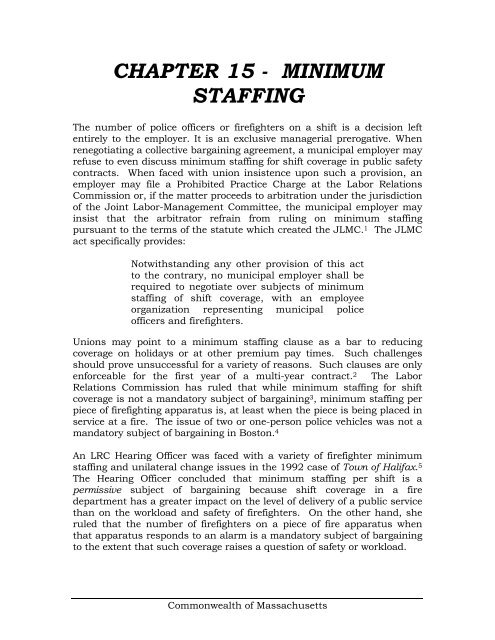Management Rights - AELE's Home Page
Management Rights - AELE's Home Page
Management Rights - AELE's Home Page
You also want an ePaper? Increase the reach of your titles
YUMPU automatically turns print PDFs into web optimized ePapers that Google loves.
CHAPTER 15 - MINIMUM<br />
STAFFING<br />
The number of police officers or firefighters on a shift is a decision left<br />
entirely to the employer. It is an exclusive managerial prerogative. When<br />
renegotiating a collective bargaining agreement, a municipal employer may<br />
refuse to even discuss minimum staffing for shift coverage in public safety<br />
contracts. When faced with union insistence upon such a provision, an<br />
employer may file a Prohibited Practice Charge at the Labor Relations<br />
Commission or, if the matter proceeds to arbitration under the jurisdiction<br />
of the Joint Labor-<strong>Management</strong> Committee, the municipal employer may<br />
insist that the arbitrator refrain from ruling on minimum staffing<br />
pursuant to the terms of the statute which created the JLMC. 1 The JLMC<br />
act specifically provides:<br />
Notwithstanding any other provision of this act<br />
to the contrary, no municipal employer shall be<br />
required to negotiate over subjects of minimum<br />
staffing of shift coverage, with an employee<br />
organization representing municipal police<br />
officers and firefighters.<br />
Unions may point to a minimum staffing clause as a bar to reducing<br />
coverage on holidays or at other premium pay times. Such challenges<br />
should prove unsuccessful for a variety of reasons. Such clauses are only<br />
enforceable for the first year of a multi-year contract. 2 The Labor<br />
Relations Commission has ruled that while minimum staffing for shift<br />
coverage is not a mandatory subject of bargaining 3 , minimum staffing per<br />
piece of firefighting apparatus is, at least when the piece is being placed in<br />
service at a fire. The issue of two or one-person police vehicles was not a<br />
mandatory subject of bargaining in Boston. 4<br />
An LRC Hearing Officer was faced with a variety of firefighter minimum<br />
staffing and unilateral change issues in the 1992 case of Town of Halifax. 5<br />
The Hearing Officer concluded that minimum staffing per shift is a<br />
permissive subject of bargaining because shift coverage in a fire<br />
department has a greater impact on the level of delivery of a public service<br />
than on the workload and safety of firefighters. On the other hand, she<br />
ruled that the number of firefighters on a piece of fire apparatus when<br />
that apparatus responds to an alarm is a mandatory subject of bargaining<br />
to the extent that such coverage raises a question of safety or workload.<br />
Commonwealth of Massachusetts
















